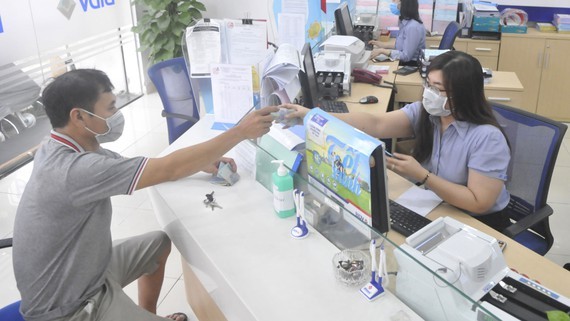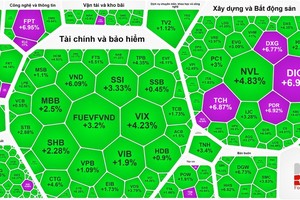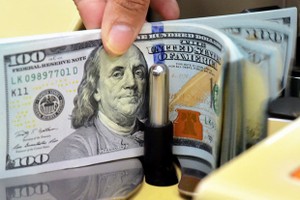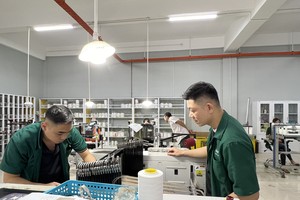
Particularly, HDBank reduced loan interest rates by 2-4.5 percent per annum for super small corporate and individual customers affected by the Covid-19 pandemic. ACB also ran the concessionary package of VND35 trillion, in which, individual customers whose jobs are affected by the pandemic are able to borrow money with interest rates up to 2 percent lower than those in 2019. Kienlongbank also cut its lending interest rates by 3 percent per annum compared to its normal interest rates for existing corporate and individual customers in the Mekong Delta until June 30 this year.
VPBank also offered a reduction of 2 percent in interest rates for enterprises in the fields of tourism, hotels, transportation, and export. Viet Capital Bank also expanded a package with a 2.5-percent interest rate cut for individual and corporate customers. SHB put aside a package of VND25 trillion with a minimum interest rate cut of 2 percent per annum compared to normal interest rates. ABBank increased the credit limit of loans for small and medium-sized enterprises to VND3 trillion with interest rates from 7.2 percent upwards.
Besides commercial banks, four state-owned banks, namely Vietcombank, BIDV, VietinBank, and Agribank, also pledged to reduce interest rates sharply by up to 2.5 percent per annum for their customers.
Sharing about the reduction of up to 25 percent of its total receivable interest for more than 85,000 customers who are on installment loans, Ms. Tran Tuan Anh, CEO of Kienlongbank, said that most customers who get installment loans are people with low incomes, just enough to cover daily expenses, such as lottery ticket sellers, motor-taxi drivers, food vendors, and small grocers. These are people who encounter lots of difficulties in life and they need support most during this time.
‘Instead of carrying out policies to reduce interest rates for new customers, Kienlongbank focuses on reducing interest for its existing customers. Because amid the context of social distancing, business closure, and no business opportunity, the demand for new loans is not much. What customers need is to deal with the current difficulties,’ said Ms. Tran Tuan Anh.
The leader of HDBank also said that the bank will automatically reduce interest rates by 2-4.5 percent for customers affected by the Covid-19 pandemic across the country without having had customers requested for support or proved any difficulties encountered.
According to the State Bank of Vietnam (SBV), from January 23 to March 28, credit institutions had restructured the repayment period and kept the debt group for more than 12,000 customers with a total outstanding debt of VND13.5 trillion. At the same time, they have been considering cutting interest for nearly 36,000 customers with a total outstanding debt of above VND91 trillion. Of which, customers are mainly in the fields of hospitality, catering services, agriculture, forestry, aquaculture, construction, wholesale, retail, and education.
Mr. Nguyen Quoc Hung, Head of the Credit Department under the SBV, said that credit by the end of March this year rose by 1.1 percent while in the first two months of this year, it merely edged up 0.06 percent, the lowest level in the past six years, due to impacts of the Covid-19 pandemic. He said that credit has started to recover, the economy has had a better and more positive approach compared to the first two months of this year. Up to now, credit growth was higher. In the past two months, credit institutions introduced credit packages with low-interest rates worth more than VND250 trillion and now have disbursed nearly VND80 trillion. According to Mr. Hung, credit packages will be maintained until the end of the pandemic, showing that liquidity of the banking system is plentiful, sufficient for the demand of enterprises and people.
To shares difficulties with customers, banks have cut lending interest rates by 0.5-4.5 percent. This is also the way for banks to boost credit demand amid a stagnant market.
However, Dr. Vu Thanh Tu Anh, Director of Fulbright School of Public Policy and Management, said that the most important thing is to ensure the liquidity for the commercial banking system, thereby supporting liquidity for enterprises affected by the pandemic. Because, if banks lower interest rates but enterprises cannot access loans, it is better for them to access credit with higher interest rates. Therefore, the current top priority is to increase liquidity instead of reducing the interest rate level. At the same time, SBV may allow banks to restructure debts of enterprises and consumer loans, such as rescheduling and delaying repayment and not putting them into the list of bad debts because these are objective risks due to the pandemic, not customers’ fault.
VPBank also offered a reduction of 2 percent in interest rates for enterprises in the fields of tourism, hotels, transportation, and export. Viet Capital Bank also expanded a package with a 2.5-percent interest rate cut for individual and corporate customers. SHB put aside a package of VND25 trillion with a minimum interest rate cut of 2 percent per annum compared to normal interest rates. ABBank increased the credit limit of loans for small and medium-sized enterprises to VND3 trillion with interest rates from 7.2 percent upwards.
Besides commercial banks, four state-owned banks, namely Vietcombank, BIDV, VietinBank, and Agribank, also pledged to reduce interest rates sharply by up to 2.5 percent per annum for their customers.
Sharing about the reduction of up to 25 percent of its total receivable interest for more than 85,000 customers who are on installment loans, Ms. Tran Tuan Anh, CEO of Kienlongbank, said that most customers who get installment loans are people with low incomes, just enough to cover daily expenses, such as lottery ticket sellers, motor-taxi drivers, food vendors, and small grocers. These are people who encounter lots of difficulties in life and they need support most during this time.
‘Instead of carrying out policies to reduce interest rates for new customers, Kienlongbank focuses on reducing interest for its existing customers. Because amid the context of social distancing, business closure, and no business opportunity, the demand for new loans is not much. What customers need is to deal with the current difficulties,’ said Ms. Tran Tuan Anh.
The leader of HDBank also said that the bank will automatically reduce interest rates by 2-4.5 percent for customers affected by the Covid-19 pandemic across the country without having had customers requested for support or proved any difficulties encountered.
According to the State Bank of Vietnam (SBV), from January 23 to March 28, credit institutions had restructured the repayment period and kept the debt group for more than 12,000 customers with a total outstanding debt of VND13.5 trillion. At the same time, they have been considering cutting interest for nearly 36,000 customers with a total outstanding debt of above VND91 trillion. Of which, customers are mainly in the fields of hospitality, catering services, agriculture, forestry, aquaculture, construction, wholesale, retail, and education.
Mr. Nguyen Quoc Hung, Head of the Credit Department under the SBV, said that credit by the end of March this year rose by 1.1 percent while in the first two months of this year, it merely edged up 0.06 percent, the lowest level in the past six years, due to impacts of the Covid-19 pandemic. He said that credit has started to recover, the economy has had a better and more positive approach compared to the first two months of this year. Up to now, credit growth was higher. In the past two months, credit institutions introduced credit packages with low-interest rates worth more than VND250 trillion and now have disbursed nearly VND80 trillion. According to Mr. Hung, credit packages will be maintained until the end of the pandemic, showing that liquidity of the banking system is plentiful, sufficient for the demand of enterprises and people.
To shares difficulties with customers, banks have cut lending interest rates by 0.5-4.5 percent. This is also the way for banks to boost credit demand amid a stagnant market.
However, Dr. Vu Thanh Tu Anh, Director of Fulbright School of Public Policy and Management, said that the most important thing is to ensure the liquidity for the commercial banking system, thereby supporting liquidity for enterprises affected by the pandemic. Because, if banks lower interest rates but enterprises cannot access loans, it is better for them to access credit with higher interest rates. Therefore, the current top priority is to increase liquidity instead of reducing the interest rate level. At the same time, SBV may allow banks to restructure debts of enterprises and consumer loans, such as rescheduling and delaying repayment and not putting them into the list of bad debts because these are objective risks due to the pandemic, not customers’ fault.
























